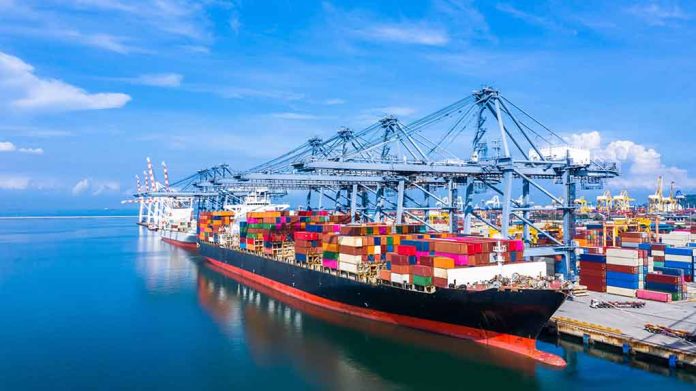
A massive cargo ship carrying 3,000 vehicles, including 800 electric cars with volatile lithium-ion batteries, has sunk in the Pacific Ocean after a devastating fire that started among the EVs, raising serious questions about the safety of transporting the green energy darlings of the Biden administration.
Key Takeaways
- The Morning Midas cargo ship sank after a fire broke out on a deck containing approximately 800 electric vehicles, forcing all 22 crew members to abandon ship.
- EV fires are extremely difficult to extinguish, requiring up to 8,000 gallons of water to cool lithium-ion batteries, with limited effectiveness in enclosed maritime environments.
- This is the second major cargo vessel to sink due to EV battery fires in recent years, following the 2022 Felicity Ace disaster in the Atlantic.
- The incident exposes significant safety concerns in the maritime shipping industry as electric vehicle transport increases globally.
- Pollution control equipment has been deployed to monitor potential environmental damage from the sunken vessel and its cargo.
EV Fire Triggers Maritime Disaster
The 46,800-ton cargo ship Morning Midas, built in 2006 and carrying approximately 3,000 vehicles manufactured in China and bound for Mexico, was abandoned in the Pacific Ocean after catching fire on June 3. According to ship manager Zodiac Maritime, the blaze originated on a deck holding about 800 electric vehicles powered by lithium-ion batteries. The 600-foot vessel had departed from Yantai, China, on May 26, visiting Nansha and Shanghai before beginning its ill-fated journey across the Pacific. Despite the crew’s efforts to control the rapidly spreading fire, they were unsuccessful, leading to a complete evacuation of all 22 crew members by the U.S. Coast Guard.
“Smoke was first seen coming from a deck on the Morning Midas that was carrying about 800 EVs, the ship’s manager Zodiac Maritime said in a statement,” said Zodiac Maritime.
After drifting helplessly for weeks following the evacuation, the Morning Midas finally succumbed to extensive fire damage and harsh weather conditions, sinking in international waters of the Pacific Ocean. The ship, weakened by the prolonged fire that had burned unchecked since early June, represents not just a significant financial loss but also a stark warning about the specific dangers posed by electric vehicles during maritime transport. Zodiac Maritime has deployed salvage tugs equipped with pollution control equipment to monitor for environmental contamination, while a specialized pollution response vessel has been dispatched to the area as a precautionary measure.
The Unique Dangers of EV Battery Fires
This disaster highlights the growing risks associated with transporting electric vehicles, particularly due to their lithium-ion batteries which present unique firefighting challenges. Unlike conventional vehicle fires, EV fires can reach extreme temperatures and are notoriously difficult to extinguish, especially in the confined spaces of cargo ships where ventilation is limited. Maritime firefighting crews often lack the resources needed to combat these intense blazes, which require approximately 8,000 gallons of water to cool a single EV battery sufficiently. Moreover, the phenomenon known as “thermal runaway” means that once a lithium-ion battery ignites, it can trigger a cascading effect in nearby batteries.
The Morning Midas incident bears striking similarities to the February 2022 sinking of the Felicity Ace in the Atlantic Ocean. That vessel, carrying approximately 4,000 vehicles including numerous luxury electric cars, also succumbed to a fire attributed to lithium-ion batteries. Both disasters underscore the maritime shipping industry’s struggle to adapt to the changing automotive landscape as EV adoption increases globally. When lithium-ion batteries burn, they also release toxic fumes that pose additional hazards to emergency responders and potentially to marine environments when vessels sink, creating multiple layers of danger from a single incident.
Industry Response and Safety Concerns
The repeated incidents involving EV fires on cargo ships have prompted shipping companies to implement enhanced safety measures and protocols. In 2024, a maritime safety group published comprehensive guidelines specifically addressing fire management on car-carrying vessels. These include improved fire detection systems, specialized training for crew members, and strategic loading practices that isolate electric vehicles from other cargo. Despite these efforts, the inherent volatility of lithium-ion batteries continues to present challenges that current maritime safety infrastructure struggles to address effectively.
Zodiac Maritime is working closely with the U.S. Coast Guard and Resolve Marine for emergency response coordination following the Morning Midas sinking. While the immediate focus remains on potential environmental impacts and salvage operations, the broader implications for the automotive and shipping industries are significant. As electric vehicle production and exports continue to increase, particularly from manufacturing hubs in China, the frequency of similar incidents may rise unless more effective safety solutions are developed and implemented throughout the global shipping network.



